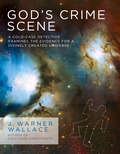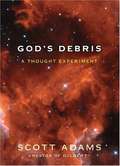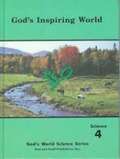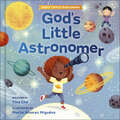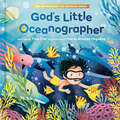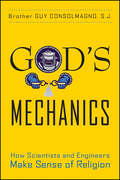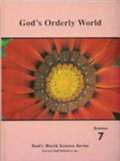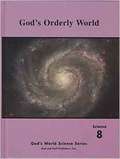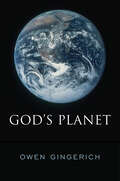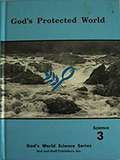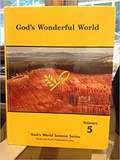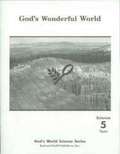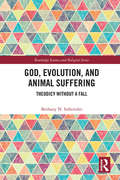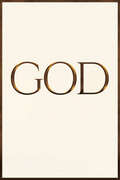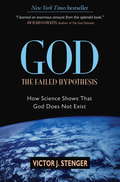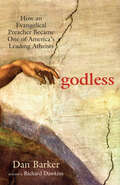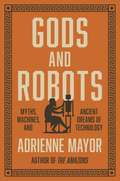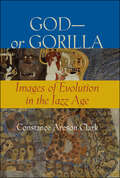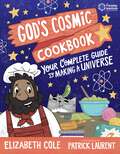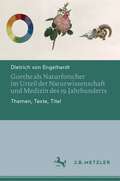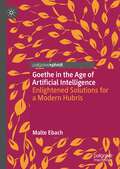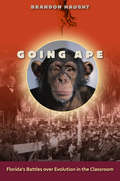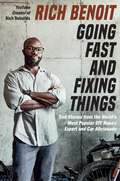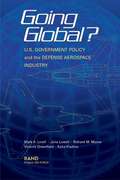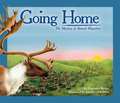- Table View
- List View
God's Crime Scene: A Cold-Case Detective Examines the Evidence for a Divinely Created Universe
by J. Warner WallaceThere are four ways to die, and only one of them requires an intruder. Suicides, accidental, and natural deaths can occur without any evidence from outside the room. But murders typically involve suspects external to the crime scene. If there's evidence of an outside intruder, homicide detectives have to prepare for a chase. Intruders turn death scenes into crime scenes. Join J. Warner Wallace, former atheist, seasoned cold-case detective, and popular national speaker as he tackles his most important case ... with you on the jury! With the expertise of a cold-case detective, J. Warner examines eight critical pieces of evidence in the "crime scene" of the universe to determine if they point to a Divine Intruder. If you have ever wondered if something (or someone) outside the natural realm created the universe and everything in it, this is the case for you.
God's Debris: A Thought Experiment
by Scott Adams"God's Debris" is a set of provocative questions (thought experiments) about God and science, wrapped in a fictional story. It is designed to inspire readers to question their views of reality.
God's Inspiring World: Science 4 (God's World Science Ser.)
by Lester Miller Barbara Schlabach Naomi Eicher Lapp Jonathan ShowalterAlso included are helpful suggestions for extra activities. Other lesson helps, such as the lesson guide and suggestions for class projects, are placed below the reduced pages. Copies of the tests with answers are included too.
God's Little Astronomer (God's Little Explorers)
by Tina ChoBlast off to space and discover how every part of the universe—the planets, the stars, asteroids, meteoroids, and more—display God&’s glory, creativity, and, most important, his love for you and me!&“An informative and inspirational bridge between science and religion for Christian households&”—Kirkus ReviewsIn God's Little Astronomer, author and educator Tina Cho invites young readers to blast off to see God&’s creation in the heavens. From the sun, moon, stars, constellations, and comets, this out-of-this-world introduction to space will teach budding astronomers new words, facts, and concepts, while also encouraging them to see God throughout the universe, and reinforcing the message that the same God loves them too.Each page includes fact-filled sidebars plus an accompanying Bible verse, making God's Little Astronomer the perfect combination of faith and science for budding scientists.
God's Little Oceanographer (Big Adventures for Growing Minds)
by Tina ChoRide the waves before diving into the depths of sea to uncover the wonders of the ocean—and God&’s deep love for you and me!From the ocean's surface, all the way to its deepest depths, this immersive picture book will teach little sea lovers new words, facts, and concepts, while also encouraging them to see God's creativity, playfulness, power, and love in every splash and every wave. Written by an elementary school teacher, each page includes fact-filled sidebars plus an accompanying Bible verse, making God's Little Oceanographer the perfect faith friendly science adventure for kids interested in marine life and activities. The masterfully layered and rich illustrations include sharks, dolphins, otters, sea turtles, whales, octopuses, and so much more!
God's Mechanics: How Scientists and Engineers Make Sense of Religion
by Guy ConsolmagnoWith an &“adroit and self-effacing style,&” a Catholic brother, astronomer and physicist explains how scientists and engineers make sense of religion. In God's Mechanics, Brother Guy tells the stories of those who identify with the scientific mindset—so-called &“techies&”—while practicing religion. A self-decribed techie, astronomer, physicist and Director of the Vatican Observatory, Brother Guy shares some classic philosophical reflections, as well as his interviews with dozens of fellow techies, and his own personal take on his Catholic beliefs to provide, like a set of &“worked out sample problems,&” the hard data on the challenges and joys of embracing a life of faith as a techie. And he also gives a roadmap of the traps that can befall an unwary techie believer. With lively prose and wry humor, Brother Guy shows how he not only believes in God but gives religion an honored place alongside science in his life. This book offers an engaging look at how—and why—scientists and those with technological leanings can hold profound, &“unprovable&” religious beliefs while working in highly empirical fields. Through his own experience and interviews with other scientists and engineers who profess faith, Brother Guy explores how religious beliefs and practices make sense to those who are deeply rooted in the world of technology. &“Brother Guy Consolmagno speaks in the softest, sanest voice imaginable as he enters the current firestorm of opinion re science and religion. His engaging commentary exposes the mindset of a true &‘techie&’—but one who equates science with a sacred act.&” —Dava Sobel, author, Galileo&’s Daughter
God's Orderly World (God's World Science)
by Lester Showalter Peter BalholmGod's World Science Series
God's Planet
by Owen GingerichAn “eminent scholar . . . shows how religious perspectives have played significant roles in major scientific discoveries and frameworks. . . . fascinating.” (Choice)Today, science and religion are the two major cultural entities on our planet that seek a coherent explanation for the structure, origins, and fate of the universe, and of humanity’s place within it, though their interpretation of evidence differs dramatically. Many scientists look at the known universe and conclude we are here by chance. The renowned astronomer and historian of science Owen Gingerich looks at the same evidence?along with the fact that the universe is comprehensible to our minds?and sees it as proof for the planning and intentions of a Creator-God. God’s Planet exposes the fallacy in thinking that science and religion can be kept apart.Gingerich frames his argument around three questions: Was Copernicus right, in dethroning Earth from its place at the center of the universe? Was Darwin right, in placing humans securely in an evolving animal kingdom? And was Hoyle right, in identifying physical constants in nature that seem singularly tuned to allow the existence of intelligent life on planet Earth? Using these episodes from the history of science, Gingerich demonstrates that cultural attitudes, including religious or antireligious beliefs, play a significant role in what passes as scientific understanding. The more rigorous science becomes over time, the more clearly God’s handiwork can be comprehended.“Owen Gingerich provides new facts and deeper understanding of [Copernicus, Darwin, Hoyle].” —Freeman Dyson, author of The Scientist as Rebel“[A] short, punchy, accessible, and thought-provoking book.” —Christian Century“A rich volume you’ll want to keep in your library.” —Forbes.com
God's Protected World: Science 3 (God's World Science)
by Lester Miller Naomi LappThis is the Student Edition from a set of 3rd grade science books by the Rod and Staff Publishers Inc. It has 7 units focusing on water, states of matter, seasons, temperature, humans, animals, and stewardship.
God's Wonderful World: Science 5 (God's World Science Ser.)
by Steven MastGod's Wonderful World--Science 5
God's Wonderful World: Science 5 Tests
by Steven MastUnit tests for God's Wonderful World. 8 tests. Answers are found in the teacher's manual.
God, Evolution, and Animal Suffering: Theodicy without a Fall (Routledge Science and Religion Series)
by Bethany N. SollerederAfter the publication of On the Origin of Species in 1859, theologians were faced with the dilemma of God creating through evolution. Suddenly, pain, suffering, untimely death and extinction appeared to be the very tools of creation, and not a result of the sin of humanity. Despite this paradigm shift, the question of non-human suffering has been largely overlooked within theodicy debates, overwhelmed by the extreme human suffering of the twentieth century. This book redresses this imbalance by offering a rigorous academic treatment of the questions surrounding God and the suffering of non-human animals. Combining theological, philosophical, and biblical perspectives, this book explores the relationship between God and Creation within Christian theology. First it dismantles the popular theological view that roots violence and suffering in the animal kingdom in the fall of humanity. Then, through an exploration of the nature of love, it affirms that there are multiple reasons to suggest that God and creation can both be "good", even with the presence of violence and suffering. This is an innovative exploration of an under-examined subject that encompasses issues of theology, science, morality and human-animal interactions. As such, it will be of keen interest to scholars and academics of religion and science, the philosophy of religion, theodicy, and biblical studies.
God: A Sunday School Demonstration (Distant Kingdoms: The Drodenar Project Ser. #Vol. 3)
by GillGod provides the evidential truth about God’s character and His purpose. You are at the center of God’s purpose and that can change your focus from temporary to eternal considerations. There is simplicity in the message from God and it is for everyone. The often-absurd things accepted from atheism and religion are believed because people want to believe them. The things from God are never random but always fit perfectly with His purpose. The “religions of the world” are complex and changing, and people ask, “Which one is right?” Religions such as Catholicism, Protestantism, Islam, Buddhism, Hinduism, Mormonism, and we could include atheistic and agnostic thinking, are devastating to a successful life. They all share the same root problem: they are human-devised. We live in a precise, intelligent, and perfect creation and we should realize God has just as perfect a plan to fulfill His purpose. You will see that God is the perfect absence of evil and what that means to humankind. Over history, there has been nothing more destructive to the lives of people than religion. The distinction made is that the truth about God and life produces the best possible life here and in the hereafter, whereas error produces devastation. There is a real WAR, but few are aware of its existence and seriousness. It will be the only thing used to determine your success or failure. It is the spiritual war between YOU and SIN.
God: The Failed Hypothesis
by Christopher Hitchens Victor J. StengerThroughout history, arguments for and against the existence of God have been largely confined to philosophy and theology, while science has sat on the sidelines. Despite the fact that science has revolutionized every aspect of human life and greatly clarified our understanding of the world, somehow the notion has arisen that it has nothing to say about the possibility of a supreme being, which much of humanity worships as the source of all reality. This physicist and author contends that, if God exists, some evidence for this existence should be detectable by scientific means, especially considering the central role that God is alleged to play in the operation of the universe and the lives of humans. Treating the traditional God concept, as conventionally presented in the Judeo-Christian and Islamic traditions, like any other scientific hypothesis, Stenger examines all of the claims made for God's existence. He considers the latest Intelligent Design arguments as evidence of God's influence in biology. He looks at human behavior for evidence of immaterial souls and the possible effects of prayer. He discusses the findings of physics and astronomy in weighing the suggestions that the universe is the work of a creator and that humans are God's special creation. After evaluating all the scientific evidence, Stenger concludes that beyond a reasonable doubt the universe and life appear exactly as we might expect if there were no God. This paperback edition of the New York Times bestselling hardcover edition contains a new foreword by Christopher Hitchens and a postscript by the author in which he responds to reviewers' criticisms of the original edition.
Godless: How an Evangelical Preacher Became One of America's Leading Atheists
by Dan BarkerOne man shares the story of his transformation from evangelical Christian to atheist and examines the train of thought that brought him there.After almost twenty years of evangelical preaching, missionizing, and Christian songwriting, Dan Barker “threw out the bathwater and discovered that there is no baby.” In Godless, Barker describes the intellectual and psychological path he followed in moving from fundamentalism to freethought. Godless includes sections on biblical morality, the historicity of Jesus, biblical contradictions, the unbelievable resurrection, and much more. It is an arsenal for skeptics and a direct challenge to believers. Along the way, Barker relates the positive benefit readers will experience from learning to trust in reason and human kindness instead of living in fear of false judgment and moral condemnation.Advance Praise for Godless“Valuable in the human story are the reflections of intelligent and ethical people who listen to the voice of reason and who allow it to vanquish bigotry and superstition. This book is a classic example.” —Christopher Hitchens, author of God is Not Great“The most eloquent witness of internal delusion that I know—a triumphantly smiling refugee from the zany, surreal world of American fundamentalist Protestantism—is Dan Barker.” —Richard Dawkins, author of The God Delusion“Godless was a revelation to me. I don’t think anyone can match the (devastating!) clarity, intensity, and honesty which Dan Barker brings to the journey—faith to reason, childhood to growing up, fantasy to reality, intoxication to sobriety.” —Oliver Sacks, author of Musicophilia“In Godless, Barker recounts his journey from evangelical preacher to atheist activist, and along the way explains precisely why it is not only okay to be an atheist, it is something in which to be proud.” —Michael Shermer, publisher of Skeptic Magazine“Godless is a fascinating memoir and a handbook for debunking theism. But most of all, it is a moving testimonial to one man’s emotional and intellectual rigor in acclaiming critical thinking.” —Robert Sapolsky author of Why Zebras Don’t Get Ulcers
Gods and Robots: Myths, Machines, and Ancient Dreams of Technology
by Adrienne MayorThe fascinating untold story of how the ancients imagined robots and other forms of artificial life—and even invented real automated machinesThe first robot to walk the earth was a bronze giant called Talos. This wondrous machine was created not by MIT Robotics Lab, but by Hephaestus, the Greek god of invention. More than 2,500 years ago, long before medieval automata, and centuries before technology made self-moving devices possible, Greek mythology was exploring ideas about creating artificial life—and grappling with still-unresolved ethical concerns about biotechne, “life through craft.” In this compelling, richly illustrated book, Adrienne Mayor tells the fascinating story of how ancient Greek, Roman, Indian, and Chinese myths envisioned artificial life, automata, self-moving devices, and human enhancements—and how these visions relate to and reflect the ancient invention of real animated machines.As early as Homer, Greeks were imagining robotic servants, animated statues, and even ancient versions of Artificial Intelligence, while in Indian legend, Buddha’s precious relics were defended by robot warriors copied from Greco-Roman designs for real automata. Mythic automata appear in tales about Jason and the Argonauts, Medea, Daedalus, Prometheus, and Pandora, and many of these machines are described as being built with the same materials and methods that human artisans used to make tools and statues. And, indeed, many sophisticated animated devices were actually built in antiquity, reaching a climax with the creation of a host of automata in the ancient city of learning, Alexandria, the original Silicon Valley.A groundbreaking account of the earliest expressions of the timeless impulse to create artificial life, Gods and Robots reveals how some of today’s most advanced innovations in robotics and AI were foreshadowed in ancient myth—and how science has always been driven by imagination. This is mythology for the age of AI.
God—or Gorilla: Images of Evolution in the Jazz Age (Medicine, Science, and Religion in Historical Context)
by Constance A. ClarkAs scholars debate the most appropriate way to teach evolutionary theory, Constance Areson Clark provides an intriguing reflection on similar debates in the not-too-distant past. Set against the backdrop of the Jazz Age, God—or Gorilla explores the efforts of biologists to explain evolution to a confused and conflicted public during the 1920s. Focusing on the use of images and popularization, Clark shows how scientists and anti-evolutionists deployed schematics, cartoons, photographs, sculptures, and paintings to win the battle for public acceptance. She uses representative illustrations and popular media accounts of the struggle to reveal how concepts of evolutionary theory changed as they were presented to, and absorbed into, popular culture.Engagingly written and deftly argued, God—or Gorilla offers original insights into the role of images in communicating—and miscommunicating—scientific ideas to the lay public.
God’s Cosmic Cookbook
by Elizabeth ColeWith gentle humour and fun illustrations, this book confidently combines faith and science as God-the-chef helps readers navigate through the Big Bang, Inflation Theory, and getting to know your Goldilocks stars from your supermassive black holes. And that's not all! As you explore God's creative processes, you'll also see some of the beauty and complexity involved in getting things just right for life as we know it to unfold.This book has been created in partnership with The Faraday Institute for Science and Religion, Cambridge, UK. They have helped in every part of the process to ensure our science and theology are in line with current understandings and discoveries.
Goethe als Naturforscher im Urteil der Naturwissenschaft und Medizin des 19. Jahrhunderts: Themen, Texte, Titel
by Dietrich von EngelhardtGoethe als Naturforscher findet bei deutschen und ausländischen Naturforschern und Medizinern des 19. Jahrhunderts durchgängig Beachtung und führt zu einer Fülle spezifischer Goethe in dieser Hinsicht gewidmeten Studien mit Interpretationen und Beurteilungen – neben wiederholt vorkommenden knapperen Ausführungen oder kurzen Hinweisen in naturwissenschaftlichen und medizinischen Publikationen der Zeit. Übergreifende Veröffentlichungen über Goethe und die Romantik, über seine Stellung in Europa, über seine Beziehungen zu England, Frankreich, Italien, Spanien, den skandinavischen und slavischen Ländern behandeln meist nur seine literarischen und geisteswissenschaftlichen Werke und gehen allenfalls begrenzt auf seine naturwissenschaftlichen Beiträge und ihre Aufnahme in den Naturwissenschaften und Medizin ein. Diese fachspezifische Zurückhaltung gilt auch für Bibliographien der Übersetzungen deutscher Veröffentlichungen des 19. Jahrhunderts in europäische Sprachen; naturwissenschaftliche und medizinische Publikationen kommen in ihnen nicht oder nur sporadisch vor. Der vorliegende Band schließt diese Lücke. Neben einer umfassenden Bibliographie von 260 Titeln von Naturwissenschaftlern und Medizinern über Goethe als Naturforscher steht eine Wiedergabe von 48 entsprechenden nicht nur deutschen, sondern vor allem auch internationalen und oft an entlegenen Orten erschienenen Arbeiten.
Goethe in the Age of Artificial Intelligence: Enlightened Solutions for a Modern Hubris
by Malte EbachInside you lies a precise scientific instrument – the ability to observe Nature and recall past experiences. You were born with it and you use it every day. You can be trained to use it more effectively to, for example, compare and discover new species of organisms or new minerals. Our senses do have limitations, and we often use microscopes, telescopes and other tools to aid our observation. However, we benefit from knowing their limitations and the impact they have on our ability to combine our observations and our experience to make decisions. Once these tools replace our direct observation and our experience we ourselves become disconnected from Nature. Scientific practice turns into well-meant opinions out-weighing empirical evidence. This is happening now in the current age of big data and artificial intelligence. The author calls this the Modern Hubris and it is slowly corroding science. To combat the Modern Hubris and to reconnect with Nature, scientists need to change the way they practise observation. To do so may require the scientist to transform themself. One person who successfully did this was Johann Wolfgang von Goethe. His journey demonstrates how one man attempted to take on the Modern Hubris by transforming his life and how he saw Nature. Following Goethe’s transformation teaches us how we can also reconnect ourselves with Nature and Natural science.
Going Ape: Florida's Battles over Evolution in the Classroom
by Brandon HaughtBefore William Jennings Bryan successfully prosecuted John Scopes in the infamous “Scopes Monkey Trial,” he was a prominent antievolution agitator in Florida.In Going Ape, Brandon Haught tells the riveting story of how the war over teaching evolution began and unfolded in Florida, one of the nation’s bellwether states. It still simmers just below the surface, waiting for the right moment to engulf the state.The saga opens with the first shouts of religious persecution and child endangerment in 1923 Tallahassee and continues today with forced delays and extra public hearings in state-level textbook adoptions. These ceaseless battles feature some of the most colorful culture warriors imaginable: a real estate tycoon throwing his fortune into campaigns in Miami; lawmakers attempting to insert the mandatory teaching of creationism into bills; and pastors and school board members squabbling in front of the national media that descends into their small town. The majority of participants, however, have been, and still are, average people, and Haught expertly portrays these passionate citizens and the sense of moral duty that drives each of them.Given a social climate where the teaching of evolution continues to sharply divide neighbors and communities, Going Ape is a must-read for anyone concerned with the future of public education.
Going Fast and Fixing Things: True Stories from the World's Most Popular DIY Repair Expert and Car Aficionado
by Rich BenoitRich Benoit went from buying a left-for-dead Tesla to becoming a successful YouTube entrepreneur and launching The Electrified Garage, the nation&’s first successful EV-only business devoted to repairing Teslas and other electric vehicles. Today he is the world&’s most popular DIY expert and car aficionado, and now he shares his story and expertise. People are fascinated by Tesla: the cars, the stock price, and especially its headline-grabbing CEO. Rich Benoit was the first YouTuber to pull back the curtain on the cultlike business model that is the Tesla company, and he&’s personally battled its consumer-unfriendly business practices. In Going Fast and Fixing Things, Rich provides readers with behind-the-scenes access not only to his Rich Rebuilds YouTube channel but to his off-camera life as well. Throughout his life, Rich has almost always been the proverbial &“only Black guy in the room,&” but despite the fact that online car culture—especially electric vehicle fandom—skews overwhelmingly white, he has become the most popular car rebuilding guy on the internet. His voice on the page is funny and intimate and a little goofy—just like his video persona—but always tempered by a clear determination to create success for himself as well as for his fans. Going Fast and Fixing Things also includes tips to help readers fix, drive, and buy their own cars, along with advice on how to defy the disposable-is-better consumerist ethos that saturates our current culture.
Going Global?
by Katia Vlachos Mark A. Lorell Victoria A. Greenfield Julia F. Lowell Richard M. MooreThe increasing consolidation of the defense aerospace industry, brought about by post-Cold War reductions in defense authorizations, has led to the proliferation of cross-border relationships between U.S. and European firms. This report examines aerospace industry globalization trends with a view toward determining how the U.S. Air Force can best exploit such trends while minimizing their risks. It concludes that further research must be done to ascertain how the advantages of globalization, such as increased competition and interoperability, can best be achieved without compromising security concerns.
Going Home: The Mystery of Animal Migration
by Marianne BerkesA selection of animals that migrate by air, kind and sea represents the variety and mystery of why and how animals migrate.
